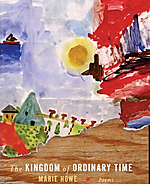(from) On Being Ill by Virginia Woolf
An essay in which Ms. Woolf argues for illness as a topic for literature and makes a case for creating a new language for illness 1926 I’d been looking for this essay, couldn’t find it in any of my libraries, and was just considering perhaps a purchase, when I came across the essay in a book on my very own bookshelf. The book is titled The Moment and Other Essays. It’s a posthumous collection, much easier to find than the single essay. This is how the essay begins: Considering how common illness is, how tremendous the spiritual change that it brings, how astonishing, when the lights of health go down, the undiscovered countries that are then disclosed, what wastes and deserts of the soul a slight attack of influenza brings to view, what precipices and lawns sprinkled with bright flowers a little rise of temperature reveals, what ancient and obdurate oaks are uprooted in us by the act of sickness, how we go down into the pit of death and feel the waters of annihilation close above our heads and wake thinking to find ourselves in the presence of angels and the harpers when we have a tooth out and come to the surface in the dentist’s arm-chair and confuse his “Rinse the mouth—rinse the mouth” with Heaven to welcome us—when we think of this, as we are so frequently forced to think of it, it becomes strange indeed that illness has not taken its place with love and battle and jealousy among the prime themes of literature. And that’s just the first sentence. 171 words if anyone’s counting. I’m drawn in by the image of those ancient and obdurate oaks. Uprooted. I feel like I’ve seen illness do that. I’m also drawn in by Woolf’s humor—the dentist as heavenly being. But is this essay a bit dated now that so much has been written and so much is now being written about illness? Maybe. Maybe not. According to Judith Shulevitz, writing in the New York Times several years ago, this essay by Woolf came about when T.S. Eliot commissioned the piece for his literary review, The New Criterion. Eliot, apparently, ended up not liking it much. But here’s the interesting part. A few years before this essay, in 1925, T.S. Eliot’s wife had “gone mad”. And, again according to Ms. Shulevitz, Eliot had consulted Virginia Woolf’s husband on the matter, and he, Leonard, had advised Eliot to keep his wife from writing. Hmmm. Shulevitz argues that the subtext of this essay is an argument by Woolf for the act of writing in the face of illness—or, say, in the face of “madness”. She concludes her review: “Woolf didn’t want sympathy; she wanted not to be silenced, and to prove to Eliot, and to us, that vulnerability has its own kind of genius.” Now that I like—vulnerability with its own kind of genius. For me, this essay by Woolf does have a kernel of genius. And it comes on the third page of fifteen, a passage in which she laments the poverty of our illness language: Finally, to hinder the description of illness in literature, there is the poverty of the language. English, which can express the thoughts of Hamlet and the tragedy of Lear, has no words for...
read more

